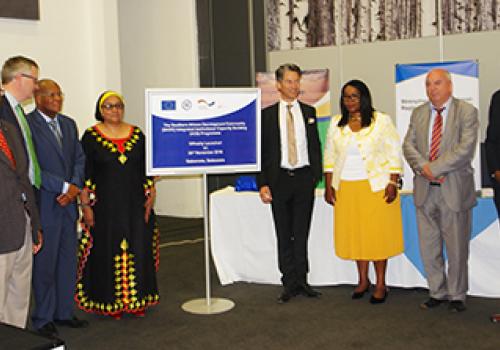The Secretariat of the Southern African Development Community (SADC), the European Union Delegation to Botswana and SADC and the Government of the Federal Republic of Germany on 23rd November, 2018 launched the SADC Integrated Institutional Capacity Building (IICB) Programme, co-funded to the tune of 18.7 Million Euros.
The IICB Programme is aimed at enhancing the capacity of national structures of SADC Member States and the Secretariat to facilitate and co-ordinate implementation of regional programmes as identified in the SADC Revised Regional Indicative Strategic Development Plan (RISDP), a development and implementation framework that guides SADC Regional Integration Agenda.
Speaking at the official launch held in Gaborone, Botswana, the Executive Secretary of SADC, Her Excellency Dr Stergomena Lawrence Tax hailed the continued and long-standing collaboration between SADC, the European Union and the Republic of Germany in promoting and deepening SADC regional integration.
H.E. Dr Tax said, through this IICB Programme, SADC will focus on activities with impact in sectoral coordinating structures in three sectors, namely Industrialization, Agriculture and Infrastructure development.
The SADC Executive Secretary said, building on the success of Strengthening National-Regional Linkages (SNRL) Programme, implemented by the GIZ since 2016, SADC will expand coverage to at least 10 Member States from the three; Malawi, Mozambique and Zambia that were supported under the SNRL programme. On this note, H.E. Dr Tax said efforts are already underway to establish and revamp SADC National Committees in Botswana, Eswatini, Lesotho and Tanzania.
In his remarks, the Head of Delegation of the European Union to Botswana and SADC, His Excellency Ambassador Jan Sadek said the relations between the EU and SADC have been very positive over the last decade and indicated that, for the future, the EU is looking to intensify existing relations and evolve the relations towards a true partnership of equals, a partnership based on strategic common interests and values and advanced through political dialogue.
H.E. Ambassador Sadek said the EU’s support to SADC is very comprehensive, addressing nearly all priority areas within SADC, such as infrastructure, trade, business environment, and agriculture and supporting peace and security, regional political cooperation and migration, thereby, contributing to the implementation of the SADC Strategic Indicative Plan for the Organ on Politics, defense and security in the region (SIPO)
He announced that, in the next four years, the EU support to SADC will reach a total of more than 150 Million Euros, of which around 80 Million Euros will be managed directly by SADC.
On his part, Ambassador of the Federal Republic of Germany to Botswana and SADC, His Excellency Ambassador Ralf Andreas Breth said Germany takes great pride in supporting the continuous capacity development of SADC structures at all levels and in many sectors.
“At the centre of the Programme’s efforts stands the realisation that with competing commitments and insufficient capacities, effective coordination of the SADC agenda at the national level is crucial,” added H.E. Ambassador Breth.
Ambassador Breth highlighted that the launch of the IICB Programme reflects and reinforces Germany’s belief of sharing the European experiences and providing opportunities to SADC and other regional organisations to benefit from them, adding that Germany is committed to supporting political and economic cooperation across national borders.
The IICB Programme is co-funded by the European Union and Government of the Federal Republic of Germany. Under the 11th European Development Fund (EDF) the EU is providing a total of €13.2 million while the Government of the Federal Republic of Germany through the German Federal Ministry for Economic Cooperation and Development (BMZ) has co-funded the implementation with an amount of €5.5 million.
The launch of the IICB Programme was attended by SADC Ambassadors and High Commissioners, the SADC Deputy Executive Secretary for Corporate Affairs, Ambassador Joseph Andre Nourrice, SADC Directors and senior officials from SADC Secretariat, representatives from the EU Delegation and Germany Embassy in Botswana, the programme managers from GIZ and EU and the media.

